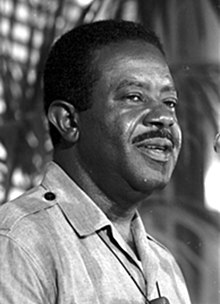Ralph D. Abernathy
| Ralph Abernathy | |
|---|---|

Abernathy in June 1968
|
|
| 2nd President of the Southern Christian Leadership Conference | |
|
In office 1968–1977 |
|
| Preceded by | Martin Luther King Jr. |
| Succeeded by | Joseph Lowery |
| Personal details | |
| Born |
Ralph David Abernathy March 11, 1926 Linden, Alabama, U.S. |
| Died | April 17, 1990 (aged 64) Atlanta, Georgia, U.S. |
| Political party | Democratic |
| Spouse(s) | Juanita Jones Abernathy |
| Children | Kwame Luthuli Ralph David Jr. (deceased) Ralph David III (deceased) Donzaleigh Juandalynn |
| Occupation | Clergyman, activist |
| Known for |
Civil Rights Movement Peace movement Closest friend and mentor of Dr. Martin Luther King |
|
|
Ralph David Abernathy Sr. (March 11, 1926 – April 17, 1990) was an American civil rights activist and Christian minister. As a leader of the nonviolent Civil Rights Movement, he was a close friend and mentor of Martin Luther King. He collaborated with King to create the Montgomery Improvement Association which led to the Montgomery Bus Boycott. He also co-founded and was an executive board member of the Southern Christian Leadership Conference (SCLC). He became president of the SCLC following the assassination of King in 1968, where he led the Poor People's Campaign in Washington, D.C. among other marches and demonstrations for disenfranchised Americans. He also served as an advisory committee member of the Congress on Racial Equality (CORE).
In 1971, Abernathy addressed the United Nations about world peace. He also assisted in brokering a deal between the FBI and Indian protestors during the Wounded Knee incident of 1973. He retired from his position as President of the SCLC in 1977 and became president emeritus. That year he unsuccessfully ran for the U.S. House of Representatives for the 5th district of Georgia. He later founded the Foundation for Economic Enterprises Development, and he testified before the U.S. Congress in support of extending of the Voting Rights Act in 1982.
In 1989, Abernathy wrote And the Walls Came Tumbling Down: An Autobiography, a controversial autobiography about his and King's involvement in the Civil Rights Movement. He was ridiculed for the revelations in the book about Martin Luther King's alleged infidelity. Abernathy eventually became less active in politics and returned to his work as a minister. He died of heart disease on April 17, 1990. His tombstone is engraved with the words "I tried".
...
Wikipedia
